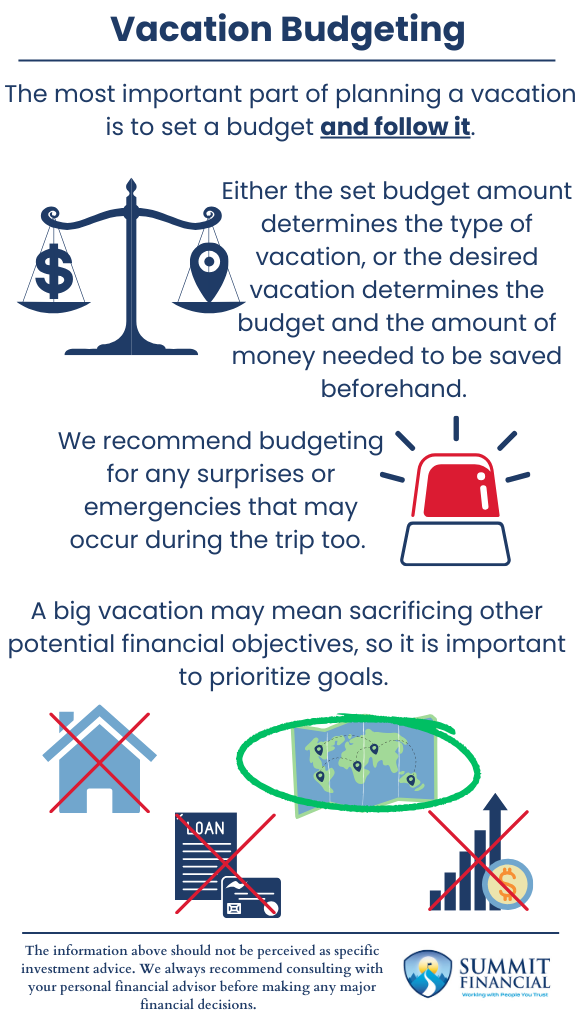My wife and I always had a trip to Italy at the very top of our bucket list. We were finally able to accomplish this during the summer, and it lived up to every one of our expectations.
We learned a lot about the country, ourselves, and what it takes to prepare for a large international trip. We planned and booked the entire trip ourselves, and it proved to be an incredibly stressful process.
Identifying an appropriate budget was extremely important, and I wanted to share some tips for future travelers.
Budgeting Basics: Helpful Resources to Start With
Before we proceed, I want to reference a couple of previous posts that may help you understand budgeting in general. We have previously written two blogs that outline and highlight the importance of budgeting:
These are great resources when preparing a monthly or event-specific budget.
Two Approaches to Travel Budgeting
There are two ways to approach budgeting for a trip:
Fixed Budget First – If you have a set amount of money dedicated toward a trip, then this amount will determine the type of vacation you can take.
Example: If you have $1,000 set aside, you are not going to be staying at an all-inclusive resort. You should consider travel options and destinations that fit within your $1,000 limit.
Trip First, Budget Second – Alternatively, you can identify your desired vacation and then determine the required budget.
For us, we were committed to Italy. After some research, we decided that $10,000 would be needed to fulfill our dreams. This meant delaying the trip until we were able to set aside that amount, which is part of why it took us so long to make it happen.

Sticking to Your Budget During Travel
By far, the most important part of planning any travel is to identify a budget, and then follow it during the trip.
It can be quite easy and tempting to overspend while you are on vacation, especially when visiting a possible once-in-a-lifetime location.
Whether it is:
- Food
- Clothing
- Souvenirs
- Activities
…there is always something more that can be purchased.
Expenses should be monitored or tracked during the vacation to ensure you remain within your set budget parameters.
Importance of a Travel Emergency Fund
We strongly recommend planning an additional buffer on top of your set budget to prepare for any surprises or emergencies.
Just like a regular emergency fund, a travel-specific emergency fund protects you from the unexpected.
Unfortunately, I had a bad case of food poisoning at the airport on our way home, and it caused us to miss our flight. We had to quickly book a hotel for the night and a new flight for the next day. Thankfully, we had set aside emergency funds for this type of situation.
If everything goes smoothly and this buffer is not needed, then you can simply reallocate the funds to another financial goal once you return home.
Balancing Travel with Other Financial Goals
Speaking of financial goals, we want to address the concern of prioritization.
Our trip was obviously very costly, and we had to decide whether to spend on travel or apply funds to another goal.
Other possible uses for those funds included:
- Investing
- Home improvements
- Paying off debt
We decided that the trip was a higher priority compared to the other options at the time.
However, we have seen cases where individuals take expensive vacations without having:
- Retirement savings
- An adequate emergency fund
Travel can be a high priority for many people, but it may be better to seek a balance between spending and saving.
It’s important to know the opportunity cost of vacations and to accept that trade-off before traveling.
Strategic Travel Budgeting – Highlights
- The most important part of planning a vacation is to set a budget and follow it.
- Either the set budget amount determines the type of vacation, or the desired vacation determines the budget and the amount of money needed to be saved beforehand.
- We recommend budgeting for any surprises or emergencies that may occur during the trip, too.
- A big vacation may mean sacrificing other potential financial objectives, so it is important to prioritize goals.
Speak With a Trusted Advisor
If you have any questions about your investment portfolio, retirement planning, tax strategies, our 401(k) recommendation service, or other general questions, please give our office a call at (586) 226-2100. Please feel free to forward this commentary to a friend, family member, or co-worker. If you have had any changes to your income, job, family, health insurance, risk tolerance, or your overall financial situation, please give us a call so we can discuss it.
We hope you learned something today. If you have any feedback or suggestions, we would love to hear them.
Best Regards,
Zachary A. Bachner, CFP®
with contributions from Robert Wink, Kenneth Wink, and James Wink.
Sources:
If you found this article helpful, consider reading:


